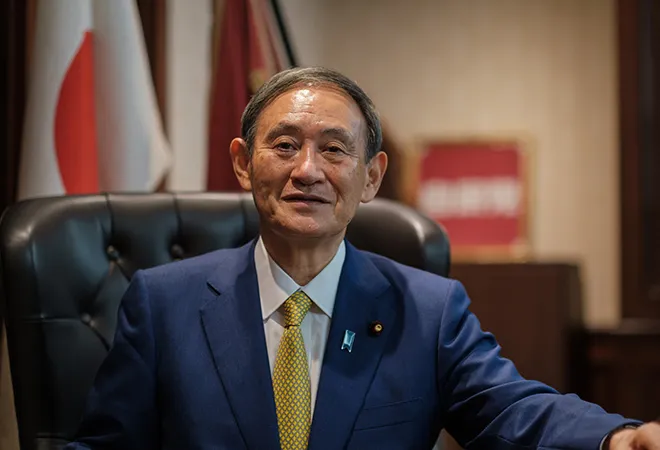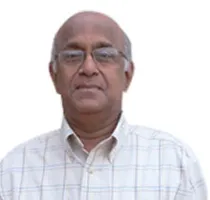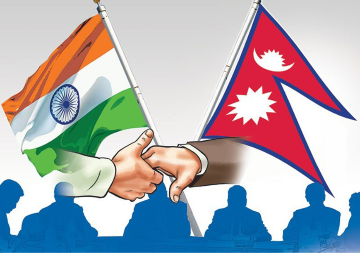
New Japanese Prime Minister Yoshihide Suga assumed office on 16 September. Since then, several significant developments contributing to the strengthening of the Free and Open Indo-Pacific (FOIP) strategy have taken place. At the very outset, Suga admitted that he would follow in the footsteps of his predecessor Shinzo Abe as far as Japan’s foreign policy was concerned, since his own experience in foreign affairs was very limited. In particular, he knew how Abe, while keeping Japan’s security alliance with the United States as the keystone of its foreign policy, went on to nurture close strategic partnerships with countries like India, Australia, and the ASEAN.
Like Abe, who resigned few months ago due to health issues, Suga believes that the concept of Free and Open Indo-Pacific would foster peace, transparency and inclusiveness in the vast region by recognising certain pre-requisite norms like (a) settling territorial or maritime disputes by peaceful means (b) avoiding measures to change the territorial status quo by force (c) adherence to universally acknowledged rules in maritime security like freedom of navigation in open seas and (d) showing respect for global commons. In short, FOIP aims to ensure that the vast Indo-Pacific region remains open, inclusive, and deeply committed to a rule-based system.
Vietnam is the current chairman of the ASEAN group and has built close economic and strategic ties with Japan.
Within less than a month after assuming office, Suga decided to undertake his first official visit to Vietnam and Indonesia for the reason that ASEAN occupies a pivotal position in the Indo-Pacific region, and Vietnam and Indonesia are the leading countries of the group. Vietnam is the current chairman of the ASEAN group and has built close economic and strategic ties with Japan. After establishing diplomatic relations in 1973, they went on to upgrade their ties to a strategic partnership in 2009.
The economy of Vietnam has become quite robust and is broadening and diversifying its base. Having struck a trade deal with the European Union recently, it is now well set to sign a similar trade agreement with the United Kingdom. With the two-way trade worth about US$28 billion, Japan is the fourth largest trading partner of Vietnam. It is also one of the leading investors in Vietnam. Additionally, Vietnam has been a major recipient of Japanese official development assistance (ODA) which has flowed into several important sectors, including infrastructure development. In recent years, following the revision of the ODA charter, Japan has also extended strategic aid to strengthen Vietnam’s maritime capabilities. They share common concerns on the aggressive maritime behaviour of China in the South and East China Seas.
In recent years, following the revision of the ODA charter, Japan has also extended strategic aid to strengthen Vietnam’s maritime capabilities.
During the current visit, both Suga and his Vietnamese counterpart, Nguyen Xuan Phuc, focused on how to make their bilateral partnership a strong pillar for realising the free and open Indo-Pacific. They agreed to take the following three steps among others to make it a reality.
First, both reached an understanding in principle to sign an agreement on the transfer of Japanese defence equipment and technology under appropriate control. Japan has signed similar agreements with more than ten countries. It has the potential to accelerate the pace of the bilateral strategic partnership by building the Vietnamese capabilities, especially in the maritime field. Tokyo has already given several patrol boats to Vietnam for its coastal defence.
Though Japan is not a party to the territorial disputes in the South China Sea, its economic and energy interests would be seriously hampered if the sea lanes passing through the area were blocked by any hostile country.
Second, both leaders share common interests in the prevalence of peace and order in the South China Sea. Though Japan is not a party to the territorial disputes in the South China Sea, its economic and energy interests would be seriously hampered if the sea lanes passing through the area were blocked by any hostile country. Japan has spoken against China’s illegal construction of artificial islands for military purposes. Japan has always urged both China and the ASEAN countries to speed up their negotiations for a lasting Code of Conduct in the South China Sea to maintain peace and order. Vietnam is a claimant in the territorial disputes in the waterway and has faced continuous Chinese encroachments on its sovereign waters often resulting in violent clashes. Complimenting the ASEAN Outlook on the Indo-Pacific (AOIP), Suga said that there are “fundamental commonalities” between AOIP and FOIP that strive to bring peace and stability to the region. Since the Trump administration has taken strong counter measures to resist China’s maritime ambitions, a great deal of tension has already been generated.
Third, following the outbreak of Covid-19, Japan was confronted by a severe scarcity of medical masks, gowns and equipment caused by the disruption of supply chains from China. Japan learnt a lesson that excessive dependence on a single country would not be in its long-term national interest. It therefore decided to encourage Japanese companies operating in China to relocate to their home market or to ASEAN countries. As of now, about 30 companies have been assigned to go to ASEAN countries, including Vietnam and Indonesia. These companies could play a key role in strengthening future economic ties between Japan and the ASEAN countries.
Japan learnt a lesson that excessive dependence on a single country would not be in its long-term national interest.
Indonesia visit
From Vietnam, Suga went to Indonesia, his second and last destination. Indonesia has always enjoyed a special position in Japan’s Southeast Asia policy because of its large population and huge natural resources. Their diplomatic relations ning over 60 years have developed into a mature partnership contributing to stability in the Indo-Pacific region. As maritime nations, both share mutual interests in keeping the waters of the Indo-Pacific free, open governed by the rule of law. Indonesia is not a party to any dispute in the South China Sea, but it has always insisted that no attempt should be made to settle issues by resorting to force. Indonesia feels the heat of China’s maritime assertiveness when Beijing lays claim to certain islands in the South China Sea that fall within the special economic zone of Indonesia.
Indonesian President Joko Widodo welcomed Suga and considered Japan-Indonesia partnership “vital especially amid increasing rivalry between world’s big powers.” Widodo does not want his country to get involved in the raging US-China conflict. On the contrary, he sees opportunities for middle powers like Japan and Indonesia to play a balancing role in regional affairs.While appreciating Indonesia’s position, Suga promised to continue to extend Japan’s infrastructure assistance to Jakarta. These projects cover a wide range of sectors, including urban transport, ports development and communication. Second, in view of the rapidly changing security situation of the Indo-Pacific, both countries decided to institute a new ministerial meeting under the 2+2 format whereby the foreign and defence ministers of the two countries will meet periodically. This will be the first time for Japan to have such an arrangement with an ASEAN country.There is no doubt that the new 2+2 meeting would broaden their security cooperation in the coming years. Third, Japan also agreed to sign an agreement on the transfer of Japanese defence equipment and technology that would facilitate sale of weapons to Indonesia.
Indonesia feels the heat of China’s maritime assertiveness when Beijing lays claim to certain islands in the South China Sea that fall within the special economic zone of Indonesia.
Suga had a fairly succesful trip to Vietnam and Indonesia. But it is also necessary to note that about two weeks prior to his visit, the Japanese government hosted two important meetings in Tokyo. The first one was the Quadrilateral meeting of the foreign ministers of Japan, Australia, India and the US on 6 October. The second one was India-Japan Foreign Ministers Strategic Dialogue on 7 October. Both these meetings also have a great deal of relevance to the future evolution of the FOIP.
Something new or unexpected. Those who have followed the evolution of the partnership know that it enjoys a great deal of resilience and a change of prime minister does not easily change its course. Even following the change of government from the Liberal Democrats to the Democratic Party in 2010 did not fundamentally alter the partnership.
Analysts have referred to the fact that Prime Minister Suga while greeting foreign dignitaries soon after assuming office, called Indian Prime Minister Modi earlier than Chinese President Xi Jinping.
Partnership with India has now become a crucial element in Japan’s foreign policy. Analysts have referred to the fact that Prime Minister Suga while greeting foreign dignitaries soon after assuming office, called Indian Prime Minister Modi earlier than Chinese President Xi Jinping. Though it was a symbolic gesture, it was followed by several significant developments showing prime minister Suga’s keenness to continue Abe’s legacy.
The first and foremost was the meeting of the so-called quadrilateral countries, namely Japan, the US, Australia and India that met in Tokyo on October 6. It was Prime Minister Abe who initiated first in 2007 and later in 2017 to bring the four countries on a common platform to promote their shared interests in ensuring that the Indo-Pacific region remains open, inclusive and free from the dominance of any single hegemonic power.
The views expressed above belong to the author(s). ORF research and analyses now available on Telegram! Click here to access our curated content — blogs, longforms and interviews.




 PREV
PREV


